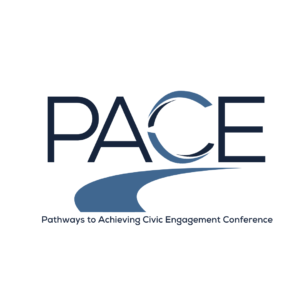
PACE Conference
NCCE’s annual Pathways to Achieving Civic Engagement (PACE) Conference seeks to grow and share the practice and scholarship of higher education community and civic engagement. Launched in 1999, PACE is the longest-running regional conference in the nation focused on this topic.
Plenary and breakout sessions advance the higher education CCE (community and civic engagement) field by sharing research findings, innovative programs and partnerships, effective curricular or co-curricular models, strategies for institutional capacity building, and best practices. Faculty, administrators, graduate students, and community partners are all welcome to explore “Pathways to Achieving Civic Engagement.” The Call for Proposals is typically released in September, with a deadline in November.
At PACE, NCCE presents the annual Engagement Awards.


PACE 2026
February 11, 2026 at Elon University
The Request for Session Proposals will open on September 1, 2025.
Brief History of PACE
1999 – NC Campus Volunteers (NCCV) (NCCE’s predecessor org) hosts 1st “Service-Learning Institute” at Elon University
2004 – Name changed to Service-Learning Conference
2009 – Name changed to PACE
2011 – Inaugural Presidents Forum hosted in conjunction with PACE
Summary of Past PACE Conferences
Host Campuses
While the PACE Conference is typically hosted at Elon University, it has also been hosted twice at High Point University and one time at Guilford College, Guilford Technical Community College (The Conference Center), UNC Greensboro, and UNC Wilmington.
Keynote Speakers
NCCE has been fortunate to host many of the top leaders in higher education and the community and civic engagement field.
Leaders of higher education and civic organizations (they are listed with the role/title they held at the time they participated in PACE)
- Timothy K. Eatman, Dean of the Honors Living-Learning Community, Rutgers University-Newark
- John S. Wilson, Managing Director of the Open Leadership Program, Chairman of the Open Leadership Council, MIT Media LabMIT Media Lab and Executive Director, Millennium Leadership Initiative, American Association of State Colleges and Universities (AASCU)
- Ted Mitchell, President, American Council on Education
- Jamie Merisotis, President, Lumina Foundation for Education
- Eric Liu, CEO, Citizen University
- Jennifer Domagal-Goldman, president of The ALL IN Democracy Challenge
- John B. King, Jr., president and CEO of the Education Trust
- Jody Kretzmann, co-founder and co-director of the Asset-Based Community Development (ABCD) Institute, Northwestern University
- Caryn McTighe Musil, Association of American Colleges and Universities
- President Mark Gearan, Hobart and William Smith Colleges
- Chancellor Nancy Cantor, Syracuse University
- Nicole Gallant, Director, Learn & Serve America, Corporation for National & Community Service
Leading Practitioner-Scholars in the higher education community & civic engagement field (they are listed with the role/title they held at the time they participated in PACE).
- Edward Zlotkowski, Bentley College
- Patti Clayton, Consultant
- Rick Battistoni, Professor of Political Science and Public and Community Service Studies, and Director of the Feinstein Institute for Public Service, at Providence College
- Byron White, Vice President for University Engagement and Chief Diversity Officer at Cleveland State University
- Barbara Holland, Researcher and Consultant
- Peter Levine, Lincoln Filene Professor of Citizenship & Public Affairs, Jonathan Tisch College of Citizenship and Public Service, Tufts University and Director, CIRCLE, The Center for Information and Research on Civic Learning and Engagement
- Judith Ramaley, President Emerita and Distinguished Professor of Public Service, Portland State University and President Emerita, Winona State University
- Robert W. Franco, Kapi’olani Community College, University of Hawai’i
- Robert L. Sigmon, Service-Learning pioneer
- Kenneth Reardon, Cornell University
- Janet Eyler, Vanderbilt University
- Robert Bringle, Director of the IUPUI Center for Service and Learning,
- Andrew Furco, Director of UC Berkeley’s Service Learning Research and Development Center
- Barbara Jacoby, University of Maryland – College Park
